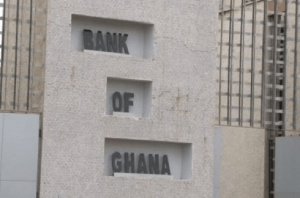Bank of Ghana raises policy rate to 22%
 The Bank of Ghana has today May 13, 2015 raised the policy rate from 21 percent to 22 percent.
The Bank of Ghana has today May 13, 2015 raised the policy rate from 21 percent to 22 percent.
Speaking to journalists at the 64th edition of the Monetary Policy Committee (MPC) press conference in Accra, Governor of the Central Bank, Dr. Kofi Wampah said growth prospects are positive as the TEN project begins operations.
He noted that a review of the latest economic data suggests that inflation and inflation expectations are elevated with the current forecasts suggesting a further lengthening of the inflation target horizon from the second half of 2016 as indicated in the last MPC round to 2017.
“This development is largely driven by exchange rate pass-through, possible upward adjustment in energy and utility prices as well as cost push factors associated with the persisting energy sector challenges,” he said.
“In particular, inflation expectations have heightened across consumers, businesses and the financial sector, which could have implications for pricing behaviour in the immediate outlook. In addition, core inflation (CPI excluding energy and utilities) has risen which gives an indication of underlying inflation pressures,” he added.
According to him, it was noted that credit to the private sector was steady, while the CIEA indicated a moderate pickup in economic activity. Growth prospects in the medium term are therefore positive, especially with the coming on stream of the TEN project as well as expected improvement in the macroeconomic environment.
He indicated that the Monetary Policy Committee also observed that fiscal performance in the first quarter has been encouraging with the deficit as well as central bank financing well within targets. Although the emerging consolidation constitutes a downside risk to growth, the subdued demand pressures will help to dampen inflation pressures.
“Sustaining the first quarter performance over the medium term is critical, and together with the tight monetary policy stance will facilitate the achievement of macroeconomic stability,” he said.
Dr. Wampah explained that because fiscal consolidation is good, that has helped to reduce the amount of tightening, otherwise the policy rate could have gone higher than the 22 percent.
By Emmanuel K. Dogbevi
